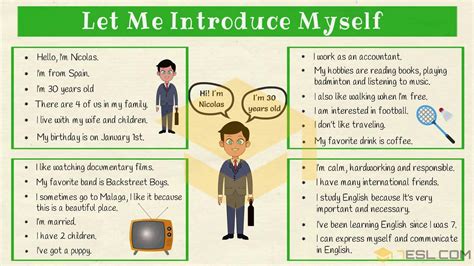Job Interview Introductions: Tips & Self-Presentation

First impressions matter, especially in a job interview. The way you introduce yourself and present yourself can greatly impact the outcome of the interview. In this article, we will provide you with valuable tips and advice on how to make a strong first impression and ace your job interview introductions.
1. Dress Professionally
One of the first things an interviewer will notice about you is your appearance. Dressing professionally not only shows that you take the job interview seriously, but it also demonstrates your respect for the company and the role you are applying for. Make sure to wear appropriate attire that aligns with the company culture and dress code.
2. Smile and Make Eye Contact
A warm smile and maintaining eye contact can go a long way in establishing a positive connection with the interviewer. It shows that you are confident, attentive, and engaged. Practice smiling naturally and maintaining eye contact before the interview to appear more friendly and approachable.
3. Start with a Strong Handshake
A firm handshake is a simple yet effective way to make a strong impression. It conveys professionalism, confidence, and assertiveness. Make sure your handshake is firm but not too strong, and maintain eye contact while shaking hands.
4. Introduce Yourself Clearly
When introducing yourself, be clear and concise. State your name, mention the position you are applying for, and briefly highlight your relevant experience or skills. Avoid rambling or providing unnecessary details. Keep it focused and to the point.
5. Prepare an Elevator Pitch
An elevator pitch is a short and compelling summary of who you are, what you do, and what you can bring to the company. It should be concise, persuasive, and tailored to the specific job you are interviewing for. Practice your elevator pitch beforehand to ensure it flows smoothly and effectively communicates your value.
6. Show Enthusiasm and Passion
Employers are not just looking for qualifications and experience; they also want to see genuine enthusiasm and passion for the role. Show your excitement and interest in the job by speaking with enthusiasm, asking thoughtful questions, and expressing your eagerness to contribute to the company’s success.
7. Demonstrate Confidence
Confidence plays a crucial role in making a positive impression. Stand tall, maintain good posture, and speak clearly and confidently. Avoid using filler words or sounding unsure of yourself. Remember, the interviewer wants to see that you believe in your abilities and can handle the responsibilities of the job.
8. Practice Active Listening
Active listening is an essential skill that can help you build rapport with the interviewer and show that you value their input. Pay close attention to what the interviewer is saying, nod in agreement, and ask clarifying questions when needed. This demonstrates your attentiveness and interest in the conversation.
9. Be Authentic and Genuine
While it’s essential to put your best foot forward in a job interview, it’s equally important to be authentic and genuine. Be yourself and let your personality shine through. Employers value authenticity and want to hire someone who will fit in with the company culture.
10. Follow Up with a Thank You Note
After the interview, send a thank you note or email to the interviewer to express your appreciation for the opportunity and reiterate your interest in the position. This shows professionalism and leaves a lasting impression.
Conclusion
Job interview introductions are your chance to make a strong first impression and set the tone for the rest of the interview. By dressing professionally, smiling, making eye contact, and introducing yourself clearly, you can create a positive impact. Additionally, demonstrating enthusiasm, confidence, active listening, and authenticity will further enhance your chances of success. Remember to follow up with a thank you note to leave a lasting impression. With these tips and self-presentation techniques, you’ll be well on your way to acing your next job interview.
Frequently Asked Questions
1. How important is the first impression in a job interview?
The first impression is crucial in a job interview as it sets the initial perception that the interviewer forms about you. It can greatly influence their overall impression and ultimately impact your chances of getting hired.
2. What should I wear for a job interview?
It’s important to dress professionally for a job interview. Research the company’s dress code and culture to determine the appropriate attire. In general, it’s better to be slightly overdressed than underdressed.
3. How long should my elevator pitch be?
Your elevator pitch should be concise and to the point, typically lasting around 30 seconds to one minute. It should highlight your key qualifications and what you can bring to the company.
4. Should I send a thank you note after a job interview?
Yes, sending a thank you note after a job interview is a good practice. It shows your appreciation for the opportunity and allows you to reiterate your interest in the position.
